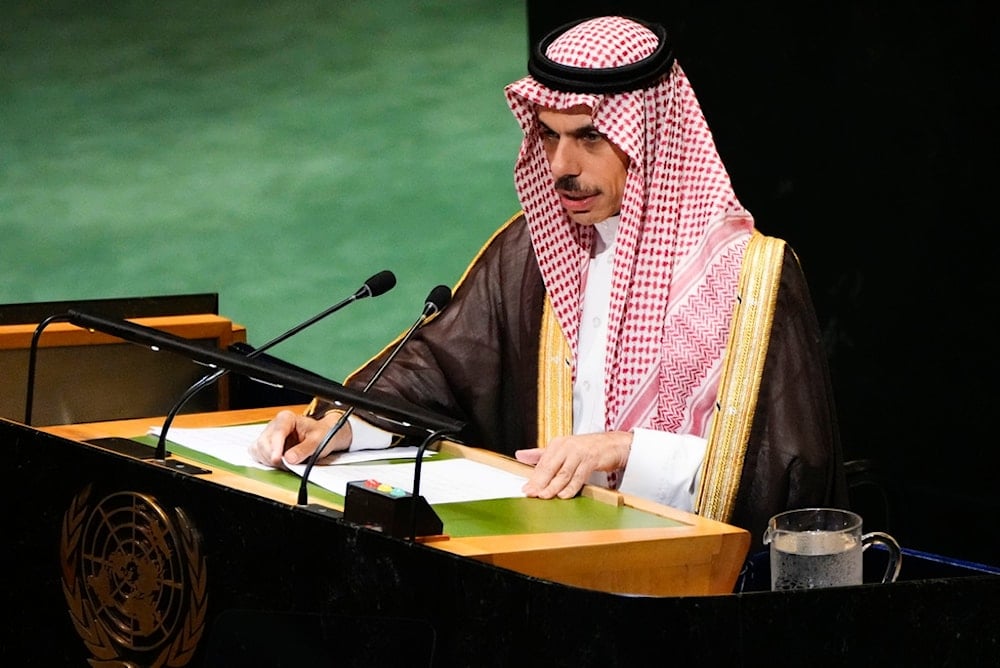Saudi FM: No normalization with 'Israel' without Palestinian state
Saudi Arabia reaffirmed that normalization with "Israel" is impossible without a sovereign Palestinian state, warning that annexation plans and regional strikes undermine peace, US credibility, and Gulf trust.
-

Saudi Arabia Foreign Minister Faisal bin Farhan Al-Saud, speaks during a high-profile meeting at the United Nations aimed at galvanizing support for a two-state solution to the Israeli-Palestinian conflict Monday, Sept. 22, 2025, at UN headquarters. (AP Photo/Yuki Iwamura)
Saudi Foreign Minister Faisal bin Farhan Al Saud on Thursday reaffirmed his country's firm stance that no normalization with "Israel" is possible unless a sovereign Palestinian state is established first.
"There cannot be a process of normalization between the kingdom [Saudi Arabia] and Israel without a Palestinian state," he declared to reporters, signaling that Riyadh will not abandon the Palestinian cause for diplomatic expediency.
Speaking at the UN General Assembly in New York, the foreign minister also addressed "Israel's" looming plans for West Bank annexation. "I think the president in the US understands very well the risks and dangers of annexation in the West Bank," he said, hinting that Washington cannot ignore the violent dispossession such moves would entail.
Saudi Arabia has stressed earlier this year that recognition and normalization are "tied to the establishment of the Palestinian state," and that normalization is off the table while Israeli aggression continues in Gaza.
Saudi Foreign Minister Faisal bin Farhan said that a Palestinian state could be established in the near future, "viable and in harmony with Israel". Speaking at the UN General Assembly, he added that Palestine is ready to resolve key issues with "Israel" pragmatically.
Normalization without justice
The remarks come amid renewed promotion of a so-called two-state solution, a formula long used to deflect from "Israel’s" ongoing settler-colonial project. Riyadh, working with France and European partners, has rallied close to 100 nations behind a roadmap framed as advancing Palestinian statehood. The plan demands an immediate end to the Gaza genocide and the release of Israeli captives, but controversially also calls for the disarmament of Hamas. For many, such conditions risk stripping them of their means of resistance while leaving intact the structures of Israeli domination.
At the same time, "Israel's" far-right leadership is pressing ahead with expansionist policies. Finance Minister Bezalel Smotrich recently revealed that he is drafting annexation maps aimed at asserting Israeli sovereignty across much of the West Bank, excluding only a handful of Palestinian cities. Meanwhile, the revival of the long-stalled E1 settlement project threatens to sever East occupied al-Quds from the West Bank, eroding any chance of territorial contiguity for a future Palestinian state.
Broken trust
Such moves, Saudi officials warn, would not only shred the viability of the two-state solution but also deepen instability across the region. For Washington, acquiescing to Israeli annexation would represent a sharp break with decades of US policy, undercut its credibility in upholding international law, and jeopardize broader regional goals such as expanding normalization agreements. Arab states, including Saudi Arabia, have made clear that any normalization without justice for Palestinians would be seen as a betrayal, undermining US-brokered accords and fueling further conflict.
The recent strike on Qatar has already fractured Gulf trust in Washington, as "Israel’s" attack on Hamas negotiators during US-brokered truce talks exposed America’s inability, or unwillingness, to rein in its ally. For many Arab states, the incident signaled that US partnership no longer guarantees regional security, deepening doubts about its credibility and intentions.
Read more: Saudi Arabia warns 'Israel' annexation may derail Arab normalization

 3 Min Read
3 Min Read








